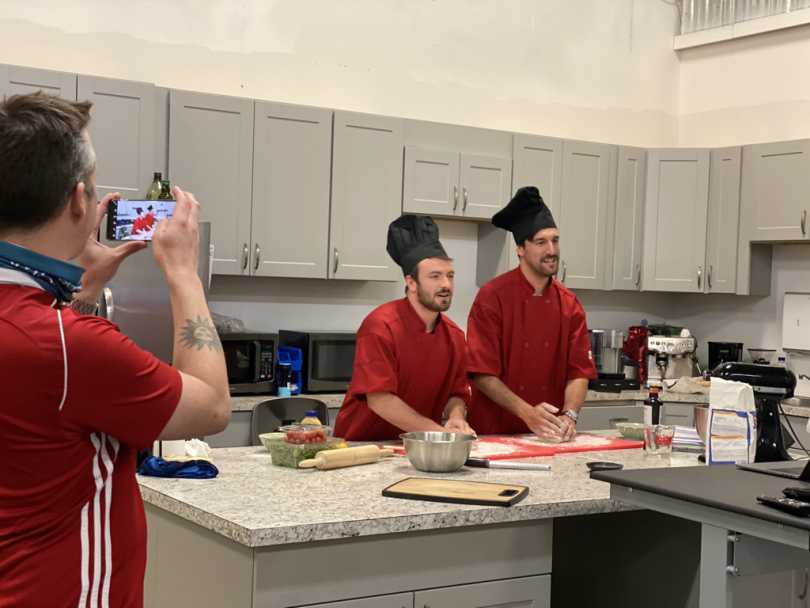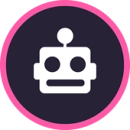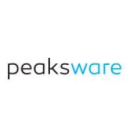
When AMP moved to remote work, the company introduced online cooking classes as a way to get team members together.
Given what subsequently unfolded, the initial endeavor appeared to be worth the effort.
“We didn’t anticipate an experimental virtual cooking show spawning upwards of 15 different social clubs in just six months,” said Office and HR Manager Russ Tebaldi, noting that subsequent, employee-created groups included film, gardening and other areas of interest. As Tebaldi observed, they weren’t mandated — but rather, team member-driven undertakings.
An emphasis on organic culture-building was also shared by BillGO’s Lindsay Stetina. “Being authentic and genuine is key,” the organization’s director of people operations said.
Indeed, while creating a connected, vibrant workplace is a must for companies continuing to work remotely, it’s important that those efforts leave room for connectedness to arise naturally.
As Caroline Ellis, HR director at Homebot, reflected, “Initially, I was concerned with trying to target events where most of the company participated,” she said. “That wasn’t sustainable; not everyone is going to want to do everything.”
Some insights culled from professionals at five Colorado teams? In order to keep culture chugging along remotely, leaders must be flexible in finding ways to forge culture (many of which intersect with employee wellbeing). Simultaneously, new efforts should be rooted in team members’ wants and desires and be cognizant of the workplace pulse.
“I believe that if you listen to your team, you will understand the current state of your company climate,” Sara Duderstadt-Cape, associate director of customer success at Travelers Haven, said. “From there, you can work on the culture.”
As HR Director Caroline Ellis described, an experimental spirit propels the Denver-based real estate tech company’s approach to developing culture. “I think it’s important to keep trying things, focusing on ways that teammates can be brought together, laugh and have fun,” she said. “That’s how our culture stays strong and will continue to stay strong in any setting.”
Most notable change in company culture since transitioning to remote work: Not only have we maintained our culture, but we have also developed even more focus on professional growth and personal well-being. In creating events like our “30-Day Wellness Challenges,” we’ve encouraged each other to leave our comfort zone with activities like daily walks, mental breaks, screen-free weekends and more. Not to mention, we can now see what our teammates are doing outside of Homebot and get glimpses into their personal lives.
In Q1, we’ve also introduced a program where everyone receives a “Winter Wellness Day” each month to take time away, with each employee receiving a $200 wellness budget to encourage recharging on that day off. We’ve adapted to the stressful times and external factors that we can’t control, transitioning our culture into one that encourages our team to focus on taking care of themselves, and in turn, showing up as their best selves.
Old and new culture-building rituals: In the office, we had an event called “Thankful Thursday,” where the entire company gathered to express gratitude and thank teammates for something they did in the last month. We didn’t want to lose this core part of our culture when going remote, so we transitioned to Zoom and now use Grubhub for lunch. It has been so rewarding to see everyone get together virtually and feel that connection and gratitude for each other even when we can’t be together in person.
Additionally, we’ve started having a weekly all-hands meeting to give updates on the business, recognize promotions, celebrate anniversaries and more. We’ve received great employee feedback around the level of transparency and communication that is now even more prevalent in our culture.
We’ve adapted to the stressful times and external factors that we can’t control.”
Advice for other companies looking for new ways to build and maintain culture right now: Try it, and always emphasize connection. Initially, I was concerned with trying to target events where most of the company participated. That wasn’t sustainable; not everyone is going to want to do everything. If only five team members attend an event, those five are taking the time to connect with their teammates; that’s impactful not just for them, but also for their teammates in how they show up positively at work. Events like our holiday trivia — which has probably been the most I’ve laughed since going remote — allowed for bonding over a fun, common interest.
Another event, our tequila and chocolate tasting happy hour, brought a large group of us together on Zoom. We focused on building deeper connections by breaking the team out into smaller groups, giving team members the opportunity to interact with colleagues they don’t usually work with.
The Louisville, Colo.-based company, which leverages AI and robotics for recycling, had to contend with the transition to remote work in a year that saw its headcount more than double, according to Office and HR Manager Russ Tebaldi. As such, maintaining a welcoming culture called for “intentional” tact, Tebaldi said.
Most notable change in company culture since transitioning to remote work: With so many new team members, we wanted to be intentional about making our employees feel welcome and offering opportunities to connect in meaningful ways.
One way we did this was through the launch of various social clubs. To engage our team members and friends remotely, we kicked off with an employee-led virtual cooking class. Other employee-created clubs — which focused on books, movies, gardening and more — followed. Last summer, we hosted an outdoor trivia night in the parking lot of our Louisville office, with socially distanced, in-person attendees, as well as remote participation. We ended the year with a “week of cheer.” During the week before Christmas, our social clubs hosted optional virtual events each evening, including holiday cookie decorating, gingerbread robot construction and a board game night.
Old and new culture-building rituals: One culture-building ritual we look forward to is our weekly Wednesday all-hands meeting, into which we’ve worked some fun extras. We’ve maintained our spotlight on new employees, where newcomers have a chance to introduce themselves with a slide about their background and what brought them to AMP.
Also, with various team members continuing to travel to customer facilities to close sales and oversee installations, since going remote we kicked off a weekly segment called “Reporter in the Field.” One of our onsite team members takes the virtual team live to a customer site to share how an installation or prospective client visit is going. The segment has offered a fun and informative view into how our work is impacting the industry in real-time and what more we can do to help.
Don’t be afraid to be creative and adventurous.”
Advice for other companies looking for new ways to build and maintain culture right now: Ask your employees what’s important to them. Don’t be afraid to be creative and adventurous. We didn’t anticipate an experimental virtual cooking show spawning upwards of 15 different social clubs in just six months. It started because we asked employees what they considered the most notable, shared interest to be across teams. The takeaway is that our culture is employee-centric and employee-generated. It’s a culture we’re fostering and encouraging but not imposing, and that’s what makes it authentic.
“We still have fun — it’s just different,” said Jack Clayton, executive project manager at the music- and sports-practicing focused software company. At the Boulder-based organization, culture materializes via virtual yoga, “monthly photo challenges” and other avenues. “Make the effort, try anything and get creative,” he recommended.
Most notable change in company culture since transitioning to remote work: On Slack, we hold monthly photo challenges and give each other kudos in a channel called #high-fives. We also have a running document of best practices for remote work, and we just released our first company cookbook. Additional remote activities include virtual yoga classes, a virtual coffee hour and, when the weather’s nice, we hold catered, individually-wrapped, socially-distant team lunches outside.
Old and new culture-building rituals: We’ve added more kudos, more birthday and anniversary celebrations, more awards and challenges, and more breakout sessions to our meetings. These rituals connect us and help us to understand each other better. We’ve also started working alongside each other in long-running meetings without an agenda. Seeing each other, laughing at jokes and discussing problems is why we have an office in the first place.
Make the effort, try anything and get creative.”
Advice for other companies looking for new ways to build and maintain culture right now: Treat your culture like a product: Hypothesize solutions, work in small chunks, get feedback fast and don’t be afraid to fail. See what works for others, tweak it for your own use and experiment. Most of us weren’t made to stare at screens all day or communicate solely via text. If you leave culture-building to chance, the result when we can get together again likely won’t be pretty.
Despite a year of change, Lindsay Stetina said that cohesion hasn’t weakened at BillGO, whose tech helps power bill paying. “We are simply closer to each other,” said the people operations director at the Fort Collins-based fintech outfit, where culture-supporting initiatives have included adapting their weekly, company-wide lunch-and-learns for Zoom.
Most notable change in company culture since transitioning to remote work: This might come as a surprise, but our culture here has absolutely gotten stronger. We are simply closer to each other. In this environment, you must be more mindful and purposeful with your intent to connect. It is how we continue to solve complex problems and stay motivated, all while having fun. For example, our President and CFO, Mike Blazes, implemented 15-minute daily standups with his entire team; it allows us to see each other’s faces each day, share updates on “hot” initiatives for the week, see how we can be helpful to each other and connect personally.
Old and new culture-building rituals: Each Wednesday, we hold a lunch-and-learn — which, prior to the pandemic, was done-in person at each of our locations; now, we hold it via Zoom — for the company’s entire 200 employees. We begin each lunch-and-learn with a celebrations section, announcing new hires, promotions, birthdays, work anniversaries and other personal life events. Afterward, we move into the educational topic for that week, which can focus on the industry, product development, company performance and more. It provides a chance to come together, ask questions, learn something new and, of course, laugh.
You must be more mindful and purposeful with your intent to connect.”
Advice for other companies looking for new ways to build and maintain culture right now: It’s all about the people. If you take care of your people first, they naturally take care of each other and the company. The positive impact that mindset can have on culture is amazing. Being authentic and genuine is key. Not only must you promote an environment of positivity; you must also have an environment that promotes “seeking to understand,” which is one of our core values here. It allows us to be transparent, listen well, give ideas their spotlight, fight criticism, and be open and receptive to others’ point of view.
At the Denver-based company, whose platform helps secure temporary housing arrangements for travelers, culture-focused updates include introducing new core values and a weekly newsletter. “Having a positive, fun, healthy company culture encourages team bonding and builds trust, which is vital for growing organizations, especially during these uncertain times,” Sara Duderstadt-Cape, associate director of customer success, said.
Most notable change in company culture since transitioning to remote work: Since moving to remote work, we added “get it done” and “earns trust” as new core values that have empowered team members and enabled growth. For example, I have seen departments within the company work together to find solutions for an issue and work together to optimize the customer experience.
Additionally, in order to encourage an active and healthy lifestyle, we launched a wellness program. Through the program — which includes fun challenges, educational programs and wellness tools — we earn points for completing activities, workouts and more. Points can be redeemed for items listed on the website or gift cards.
Old and new culture-building rituals: One ritual we’ve continued is our company-wide Monday morning standup, where a company leader updates the entire team on our goals and company stats; team members receive recognition for their accomplishments; or we set the week’s intentions with meaningful stories or meditation. These meetings help the team maintain some level of normalcy in a year of change.
New ways to cultivate our culture have included introducing a new daily trivia channel. Additionally, goals and stats are tracked and shared, and daily wins are celebrated on our internal chat. My favorite addition is the weekly “Travelers Haven newspaper,” which includes important company announcements, highlights employees who went above and beyond and provides transparency. Team members are encouraged to write an article for the newsletter about their department or something they are passionate about.
Encourage your team to make the culture they aspire to be a part of.”
Advice for other companies looking for new ways to build and maintain culture right now: While it’s important for a company to continue to find interesting problems to solve, maintaining an excellent work culture needs to be a priority as well. Encourage your team to make the culture they aspire to be a part of. I also think having cameras on is essential for virtual meetings; it may be the only human interaction you or a team member has during the day.















